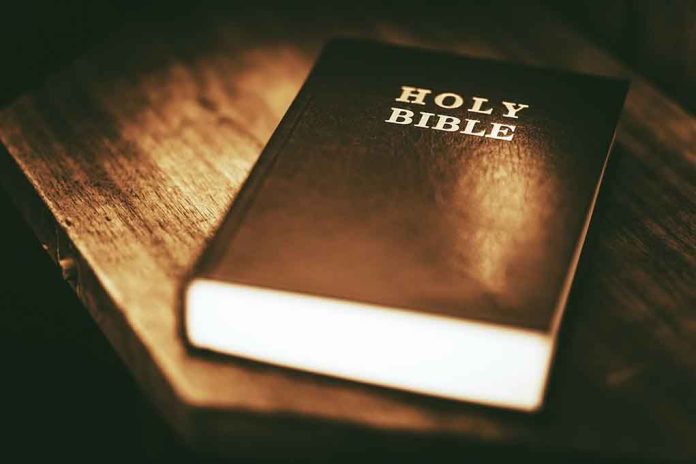
President Trump launches a groundbreaking Religious Liberty Commission to shield Americans of faith from government hostility, appointing prominent religious leaders to defend the nation’s founding principles against increasing threats to religious expression.
Key Takeaways
- President Trump signed an executive order establishing the Religious Liberty Commission, chaired by Texas Lt. Gov. Dan Patrick with Dr. Ben Carson as vice-chair, to protect religious freedoms in America.
- The commission includes prominent religious leaders and scholars such as Cardinal Timothy Dolan, Pastor Franklin Graham, Eric Metaxas, and Kelly Shackelford.
- The initiative will address First Amendment rights, religious exemptions for vaccine mandates, parental rights in education, and voluntary prayer in public schools.
- Trump has also ordered the Justice Department to establish a task force on anti-Christian bias, reflecting concerns that two-thirds of white evangelicals believe Christians face discrimination in America.
- The commission’s term runs through July 4, 2026, unless extended, and will produce a comprehensive report on the history, current threats, and future protection strategies for religious liberty.
Restoring America’s Religious Heritage
President Trump has taken decisive action to protect religious freedom in America by establishing the Presidential Commission on Religious Liberty through executive order. The commission represents a significant commitment to reversing what many conservatives view as years of hostility toward religious expression in public life. With Texas Lt. Gov. Dan Patrick as chair and former HUD Secretary Dr. Ben Carson as vice-chair, the commission brings together religious leaders, scholars, and advocates to address mounting concerns about government interference in matters of faith and conscience.
The executive order establishing the commission clearly states its purpose: “It shall be the policy of the executive branch to vigorously enforce the historic and robust protections for religious liberty enshrined in Federal law.” This declaration emphasizes the administration’s view that religious liberty represents a fundamental American value that requires renewed protection. The commission will produce a comprehensive report examining the history of religious liberty in America, current threats to religious expression, and strategies for strengthening protections for people of faith.
**Establishment of the Religious Liberty Commission**
On May 1, 2025, President Donald J. Trump signed an executive order to establish the Religious Liberty Commission. This commission will serve as a vital tool in protecting religious freedom in America, which has been under…
— executiveordersx (@execorderstrump) May 1, 2025
Distinguished Leadership and Broad Mission
President Trump has assembled an impressive roster of commission members representing diverse religious perspectives and areas of expertise. Notable appointees include Cardinal Timothy Dolan of New York, evangelist Franklin Graham, author Eric Metaxas, and First Liberty Institute President Kelly Shackelford. Television personality Dr. Phil McGraw has also been named to the commission, bringing his perspective on mental health and cultural issues. The breadth of representation demonstrates the administration’s commitment to addressing religious liberty concerns across faith traditions.
“For too long, government officials have been hostile to expressions of faith… It will be a privilege to do everything we can to protect religious liberty and restore our First Freedom for all Americans,” said Kelly Shackelford President of First Liberty Institute.
The commission’s mandate extends to examining several specific areas of concern for religious Americans. These include strengthening First Amendment protections, addressing religious exemptions for vaccine mandates, defending parental rights in religious education, ensuring faith-based institutions’ self-governance, and supporting voluntary prayer in public schools. These focus areas reflect the priorities of religious conservatives who have voiced concerns about government overreach in matters of faith, family, and conscience during previous administrations.
Addressing Growing Religious Liberty Concerns
The creation of the Religious Liberty Commission comes at a time when many religious Americans, particularly evangelical Christians, express concerns about discrimination. Public Religion Research Institute data indicates that two-thirds of white evangelicals believe Christians face discrimination in America today. This perception has contributed to strong support for President Trump among religious conservatives, with Pew Research showing high approval ratings for the President among white evangelical voters despite lower ratings among Americans overall.
“We will carry out the president’s important mission to preserve and strengthen religious liberty in our country. I thank President Trump for his steadfast commitment to ensuring our nation returns to our founding principles of faith and religious liberty,” said Texas Lt. Gov. Dan Patrick who chairs the commission.
At the commission’s announcement, President Trump emphasized his commitment to faith, declaring, “We’re bringing religion back to America. It’s a big deal.” This statement resonated with religious leaders present at the White House signing ceremony. The commission builds upon earlier Trump administration initiatives, including the Department of Justice Religious Liberty Task Force established during his first term in 2018, demonstrating a consistent commitment to religious freedom issues across both terms of his presidency.
Mixed Reactions and Historical Context
While religious conservatives have welcomed the commission, some progressive religious leaders have expressed concerns. Rev. Shannon Fleck from the Oklahoma Conference of Churches claimed the commission will do more to increase bullying in schools, workplace conflict and religious discrimination than it will to protect our constitutional rights. Similarly, Bishop Dwayne Royster of Faith in Action argued that “religious freedom is not theirs to wield as a weapon of fear or domination. These critiques highlight the ongoing tensions surrounding religious liberty protections in increasingly pluralistic America.
“The Founders envisioned a Nation in which religious voices and views are integral to a vibrant public square and human flourishing and in which religious people and institutions are free to practice their faith without fear of discrimination or hostility from the Government,” according to the executive order establishing the commission.
Trump’s Religious Liberty Commission stands in a historical tradition of presidential initiatives supporting religious expression. President Franklin Roosevelt expanded military chaplaincy programs in the 1940s, recognizing chaplains as “absolutely essential to the life of the nation.” In 1998, President Clinton established the U.S. Commission on International Religious Freedom. President George W. Bush created the White House Office of Faith-Based and Neighborhood Partnerships in 2001, later expanded by President Obama. The current commission continues this bipartisan tradition of presidential support for religious expression while addressing contemporary concerns of religious Americans.









